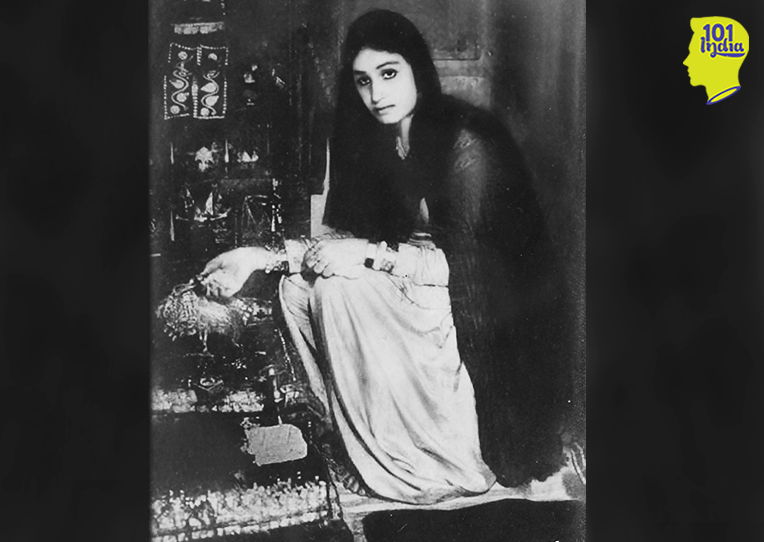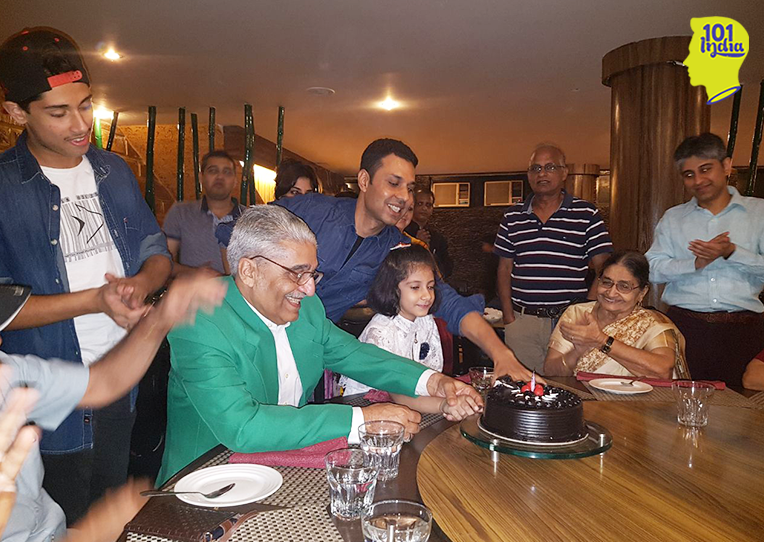The summer of 1947.
In a residential area of Noida, a three storeyed house stands with the name Kohlis on the gate. A large family of four generations lives under its roof. The family survived partition, starting their lives from scratch.
'Le kar rahenge Pakistan, le kar rahenge Pakistan’. Swaraj Kohli was a 16-year old when she heard a crowd of skull-capped men rallying on the streets near her home in Andar Sher, Peshawar. She lived her childhood where Grand Trunk road from Calcutta met Peshawar, a Muslim dominated region. Everyone lived in harmony and oneness, and communities saw each other as more than families. “I was a pre-teen and the word Pakistan was incomprehensible back then. It was hard for us to accept the divide or the gravity of the situation”.

A young Swaraj Kohli at her home in Peshawar
Krishan Kohli her husband, was 25 and part of the infantry with Subhash Chandra Bose during the days of Second World War. He was given an option to choose between the two countries. Having lived his entire life in Peshawar, he didn’t want to give up his roots over a geo-political ‘squabble’. They chose to continue living in Pakistan. The entire family was Hindu but didn’t think it was a big deal. “Only the government would change, rest would remain the way it was. We failed to imagine the instability it would bring.”
On the insistence of her parents, Swaraj left for Haridwar in June 1947. But returned to Peshawar in August with her husband. Two weeks later, Pakistan was formed.
“There was an attack in Peshawar on 7th of December. I saw men with swords, raising violent slogans heading towards our area. There was a house in front of ours with huge iron gates, like the ones we see in the forts, inside which Hindu families were taking refuge. I was in my house wearing a churidar kurta, my head covered with a dupatta. And with just the clothes I was wearing, I left my home.”
Swaraj stayed with friends, neighbours and acquaintances for a few months. She considers herself to be fortunate to have made it safely through a time of kidnapping, rape, murder, theft. The government shifted survivors to Purana Qila. And from here the nine months pregnant Swaraj, along with her husband, made the trip to Delhi.
They spent a day or two in the non-functional railway station and a local hospital. After which they boarded a goods train to Saharanpur for her parents’ home in Haridwar. But the journey wasn't simple. The goods train stopped on the Yamuna Bridge and was denied entry to UP due to over-population. They changed to a bullock cart and managed to reach. But life here was no different from Peshawar. Hindus were taking revenge from Pakistani Muslims by killing ‘their’ men here in India. Dominated by the Hindu community, killings were no less.
It was in the midst of these attacks that people reached out to each other extending a helping hand. Having seen pain, loss and cruelty, helped them become more humane. It was an accidental encounter with a Peshauri that saved them. He provided a resting place in his home in Saharanpur, and a good hearted railway official obliged them with a berth booking mid- curfew, and also extended the train halt at the station to get a lady doctor to help Swaraj through child birth. On the way to Haridwar in Jawalapur, she gave birth to a baby boy in the train and finally headed to Bhimgoda in Haridwar after another series of bullock cart rides.
“The way I left my home in Peshawar is the way Muslims in India also vacated their homes. Whoever found an empty house started living in it. After great struggle, my brother found a house in a dilapidated condition with three rooms, a garden, but no roof. Because my parents were also in Haridwar, they helped us with food and we started living there.”

Mrs. Kohli’s B.Ed and M.A degrees
Krishan ventured into a small time business, which despite great efforts and perseverance failed to flourish, putting the entire family in a hand to mouth situation. It was then that Swaraj decided to take the onus of raising her family. She sought her father’s help, who was actively involved in the Arya Samaj, to help her find a job. He requested a couple of influential local politicians who had a tuition class business. Swaraj re-started her education at Prabhakar Classes, under the affiliation of Panjab University.
“We worked hard to take away the label of refugees from our identity. We toiled and got back on our feet.”
Thinking of the old days she says, “We didn’t have food to eat but my father used to say, even if I don’t survive you’ll remember these days so make the most of your life.”
Related: No Man's Land | The India-Bangladesh Enclaves | 101 Heartland
In 1950, she cleared the Prabhakar exams and started part-time work of tutoring children for Rs. 55 a month. Soon after, she landed another job as a school teacher for Rs. 35 a month. A year later she gave birth to her second child, a daughter in 1951, but her studies didn’t stop here. Step by step she cleared her matriculation, F.A. in English, a teacher’s training course, a B.A. degree in English, B.A. in History, M.A. from Aligarh University and B.Ed. from Delhi University. Her husband also secured a job in ITC.

With her late husband Krishan Kohli
“In Pakistan, our home was close to Raj Kapoor’s house. My children often talk about visiting the place, but I don’t feel like going there anymore. I don't have great memories of it. We lost our families there. You never forget your motherland, but I don’t have the strength to go through the feelings all over again.”
The rest of her family has settled in Faridabad from refugee camps in Kurukshetra. People of Kohat, Bannu, north-west frontier, Dhakki dominate the Faridabad region, which was established to accommodate migration.
Related: Missing #1: Nanak Singh | 101 Heartland
Kanwal, her eldest son, who was born during the chaos and turmoil in a train, shares his feelings, “My parents are from Peshawar and I was born in 1947 in India, but I have always wanted to see the birth place of my parents. Though I feel a sense of insecurity about going there. What if the current residents hold feelings of revenge and hatred towards us?”

All four generations of the Kohli family celebrating Kanwal Kohli’s 70th
They talk about listening to Bollywood stalwart Dilip Kumar speak of his visit to their homeland, that too in the local Peshauri dialect. “We played it on loop to live in the moment as long as we can. I have some very dear friends in Pakistan, Rizwan Rasool being one of them, who I connected with over Facebook. We are in touch and we see life there through his social media activities.”
85 year old Swaraj and her family have no documented records of their losses. All they have are stories, pain and memories. But they have happy endings too. Today she is living a contented life with her children and grand children. She calls it a life well lived.
Disclaimer: The views expressed in this article are independent views solely of the author(s) expressed in their private capacity and do not in any way represent or reflect the views of 101india.com.
By Jincy Chacko
Cover photo credit: YouTube.com
How A Mythical Deity Became The Most Revered God In History
Dev Deepawali Celebration By Bal Brahmachari Kids Of Varanasi
All Access Mumbai With Milind Deora x JIO
Promoted Content by Outbrain |

Subscribe to our Newsletter. Your inbox will get all our latest stories and annoucements.